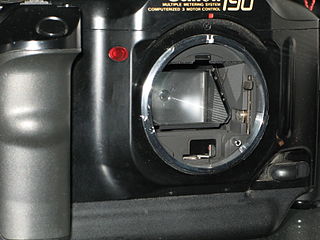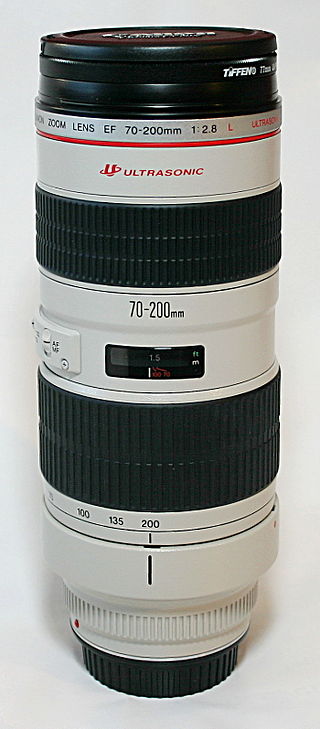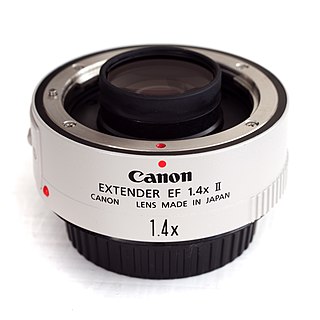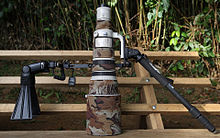
The EF lens mount is the standard lens mount on the Canon EOS family of SLR film and digital cameras. EF stands for "Electro-Focus": automatic focusing on EF lenses is handled by a dedicated electric motor built into the lens. Mechanically, it is a bayonet-style mount, and all communication between camera and lens takes place through electrical contacts; there are no mechanical levers or plungers. The mount was first introduced in 1987.

The Canon FD lens mount is a physical standard for connecting a photographic lens to a 35mm single-lens reflex camera body. The standard was developed by Canon of Japan and was introduced in March 1971 with the Canon F-1 camera. It served as the Canon SLR interchangeable lens mounting system until the 1987 introduction of the Canon EOS series cameras, which use the newer EF lens mount. The FD mount lingered through the release of the 1990 Canon T60, the last camera introduced in the FD system, and the end of the Canon New F-1 product cycle in 1992.

The EF 70–200mm lenses are a group of telephoto zoom full-frame lenses made by Canon. The lenses have an EF mount to work with the EOS line of cameras.

The EF 16–35 mm lens is a family of professional wide-angle lenses made by Canon Inc. The original version, the EF 16-35mm f/2.8L USM, replaced the EF 17-35mm f/2.8L USM lens, which had itself replaced the EF 20-35mm f/2.8L lens.

The EF 17–40mm f/4L USM lens is a wide-angle lens made by Canon Inc. The lens has an EF mount to work with the EOS line of cameras. Other than the front element, it is sealed against dust and water, and features a diaphragm which remains nearly circular from f/4 to f/8. It is one of the few Canon photo lenses that are parfocal.

The EF 1200 mm f/5.6 L USM is a super-telephoto prime lens that was made by Canon Inc. It uses an EF mount, and is compatible with the Canon EOS camera range. It has a focal length of 1200 mm and so on a digital body with a sensor size of 22.5 mm × 15 mm, such as a Canon EOS 40D or 450D, it provides a 35 mm field of view equivalent to that of a 1920 mm lens. With a body with a sensor size of 28.8 mm × 19.2 mm, such as a Canon EOS-1D Mark IV, the field of view is equivalent to that of a 1560 mm lens.

The EF 50mm lenses are a group of normal prime lenses made by Canon that share the same focal length. These lenses are based on the classic double-Gauss lens, with the f/1.8 being a standard six-element double-Gauss with an air gap and powers between element 2 and 3 and its faster cousins adding additional elements. The 50mm focal length, when used with a 35mm film or full-frame sensor, has been widely considered to match the perspective seen by the human eye.
The Canon EF 35mm lenses are a family of wide angle prime lenses with EF mount made by Canon Inc. The family also includes one EF-S lens that only mounts on Canon bodies with APS-C sensors.

The EF 85mm lenses are a group of medium telephoto prime lenses made by Canon Inc. that share the same focal length. These lenses have an EF type mount that fits the Canon EOS line of cameras.

Canon's series of L lenses are a professional line of photography lenses made by Canon. Canon has sold zoom and prime L-series lenses for the discontinued FD lens mount, for the current EF lens mount used on all Canon EOS SLR cameras and for the RF mount used on full-frame mirrorless interchangeable-lens cameras.
The EF 24–105mm f/4L IS USM is an EF mount wide-to-telephoto zoom lens. It was introduced by Canon in 2005 to complement the well-regarded 17–40mm f/4L USM and 70–200mm f/4L USM.
The EF 100–400 mm f/4.5–5.6L IS USM is a professional EF mount telephoto zoom lens manufactured by Canon Inc. The first version of this lens was announced in September 1998, and an updated version was announced in November 2014. It is a high performance telephoto lens most often used for sports and wildlife photography.
The EF 300mm lens refers to a family of telephoto prime lenses made by Canon, five of which have been sold to the general public and one of which was only made on special order. The lenses have an EF type mount which fits the Canon EOS line of cameras.
Canon Inc. has produced seven different 24mm lenses for its Canon EF and EF-S lens mounts. Three have been discontinued after updated replacements were announced.
The Canon EF 600mm is a super-telephoto lens made by Canon Inc. The lens has an EF mount to work with the EOS line of cameras.

The Canon EF 800mm f/5.6L IS USM lens is a super-telephoto lens by Canon Inc., released at a manufacturer's suggested retail price of US$11,999.00 and now selling at an MSRP of $12,999.00.

The Canon Extender EF lenses are a group of teleconverter lenses made by Canon. These lenses are used between any compatible EF type lens and any of the Canon EOS line of cameras. When used with a compatible lens, they will multiply the focal length of the lens by a factor of either 1.4x or 2x, at the cost of decreasing the lens' aperture by 1 or 2 stops respectively. For example, using a 1.4x or 2x extender with the Canon EF 500mm f/4L IS USM would result in a 700mm f/5.6 or 1000mm f/8 lens.

The EF8–15mm f/4L FISHEYE USM is a fisheye zoom lens for Canon digital single-lens reflex cameras (DSLRs) with an EF lens mount. It delivers 180° diagonal angle of view images for all EOS SLR cameras with imaging formats ranging from full-frame to APS-C, and provides 180° circular fisheye images for full-frame EOS models. Announced by Canon in 2010, it features UD glass for suppression of chromatic aberration and a subwavelength coating for reduced ghosting. It has full-time manual focus for instant switching from AF to Manual operation.
The EF 200–400 mm f/4L IS USM Extender 1.4× is an EF mount super telephoto zoom lens produced by Canon. It is part of the professional L-series and functions with the Canon EOS line of cameras. The EF 200–400 mm lens features an ultrasonic motor, image stabilization and weather sealing. It is the first and only EF lens with a built-in extender.
The EF 11–24 mm f/4L USM lens is a professional wide-angle lens made by Canon Inc. It was announced on February 5, 2015, and at that time was the widest rectilinear lens ever made for the 35 mm format in either its film or digital versions.














